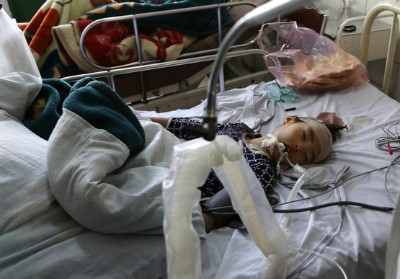By Rebecca Kheel
The number of children killed or injured in the war in Afghanistan is on the rise, according to a United Nations report released Wednesday.
The U.N. Assistance Mission in Afghanistan (UNAMA) “is deeply concerned by the continuing increase in child casualties, which have risen year-on-year since 2013,” the report says.
From Jan. 1 to Sept. 30, 639 children were killed and another 1,822 were injured, according to the report. That’s a 15 percent increase from the same period in 2015.
More than half of the child casualties were caused by ground engagements.

In this Oct. 12, 2016, file photo, Farishta, 8, receives treatment after a militant attack on a Shiite shrine, the night before in Kabul, Afghanistan. UNAMA says in its third quarter report that out of a total of 2,461 children’s casualties that the mission documented in 2016, there were 639 deaths and 1,822 wounded. That’s a 15 percent increase, compared to the same period in 2015. (Photo: Rahmat Gul/AP)
Children were also a large percentage of the overall number of civilians killed or injured by unexploded ordnance, which claimed a total of 510 civilian casualties.
“Eighty-four percent of victims from unexploded ordnance were children,” Danielle Bell, UNAMA human rights director, said in the report. “All parties must systematically track, mark and clear unexploded ordinance in order protect current and future generations of children from harm.”
In all, 2,562 civilians were killed and 5,835 were injured in the first nine months of the year, according to the report. That’s a 1 percent decrease from the same period last year.
Anti-government forces such as the Taliban were responsible for 61 percent of the casualties, while pro-government forces were responsible for 23 percent.
The rest of the casualties were either jointly attributed because they happened during ground fighting where it was hard to tell exactly which side was responsible, or were attributed to unexploded ordnance of unknown origin.
The number of casualties from anti-government forces was a 12 percent decrease from the same period last year, but UNAMA continued to document illegal or indiscriminate attacks from those forces.
“Notwithstanding these decreases, attacks conducted by anti-government elements directly targeting civilians or in areas with a large civilian presence continued,” the report said. “UNAMA recorded attacks intentionally targeting peaceful civilian demonstrators, educational facilities, judicial and media workers, as well as attacks conducted in civilian-populated urban areas including bazaars and religious facilities.”
For example, UNAMA documented 75 attacks targeting education. The report also highlighted the Islamic State in Iraq and Syria's attack on a peaceful protest in Kabul in July, which killed 85 people in the deadliest single attack in the capital since 2001.
Meanwhile, civilian casualties from pro-government forces increased 42 percent from last year.
UNANA also noted a rise in the number of casualties caused by pro-government airstrikes, which killed 133 civilians and injured 159. That’s a 72 percent increase from last year. One-third of this year’s airstrike casualties were caused by international forces, which would include the United States.
UNAMA commended the Afghan government for approving a national policy on civilian casualty mitigation but said more work needs to be done to implement the policy.
“There is an urgent need for the government to implement the National Civilian Casualty Prevention and Mitigation policy,” Tadamichi Yamamoto, head of UNAMA, said in the report, “and for anti-government elements to cease the use of indiscriminate and illegal devices and tactics.”



